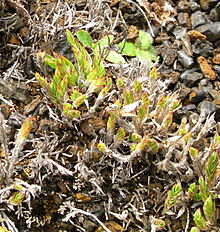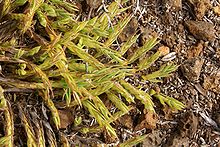Panicum lycopodioides
Appearance
| Panicum lycopodioides | |
|---|---|

| |

| |
| Scientific classification | |
| Kingdom: | Plantae |
| Clade: | Tracheophytes |
| Clade: | Angiosperms |
| Clade: | Monocots |
| Clade: | Commelinids |
| Order: | Poales |
| Family: | Poaceae |
| Subfamily: | Panicoideae |
| Genus: | Panicum |
| Species: | P. lycopodioides
|
| Binomial name | |
| Panicum lycopodioides Bory ex Nees
| |
Panicum lycopodioides, common name false club-moss panic grass or (in French) panic faux-lycopode, is endemic to the French island of Réunion in the Indian Ocean. It is found at high altitudes on the island, at elevations over 2000 m (6700 feet). The highest point on the island is Piton des Neiges, 3069 m (10,230 feet). The plant requires full sun-light and a cold climate.[1]
The specific epithet "lycopodioides" means "similar to Lycopodium" in reference to the plant's general habitus superficially resembling certain species of club-moss. Stems grow horizontally, branching frequently, thus forming mats pressed against the ground. Leaves are small, pressed against the stem like the scales of Lycopodium.[2]
References
[edit]- ^ Accuiel de Kriss Nature, panic faux-lycopode, Panicum lycopodioides
- ^ Bory, Jean Baptiste Georges Geneviève Marcellin, in Nees von Esenbeck, Christian Gottfried Daniel. Flora Brasiliensis seu Enumeratio Plantarum 2(1): 236. 1829.
